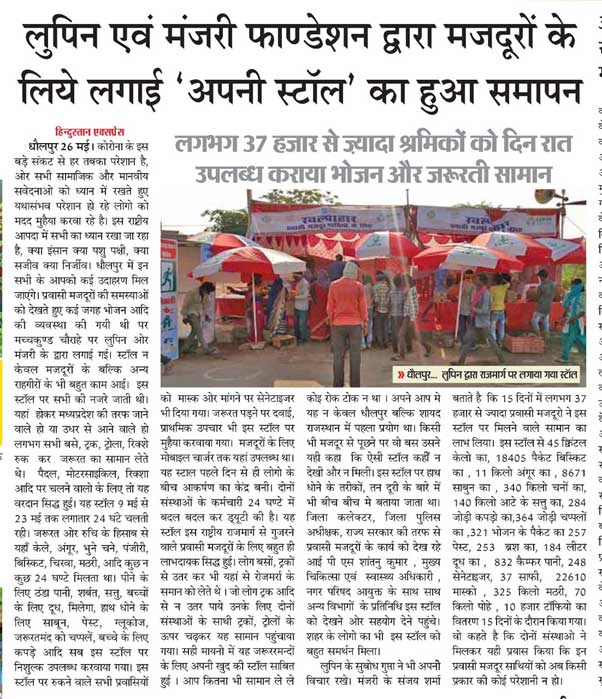A Painful Journey of Hunger, Unfulfilled Promises and Shattered Hopes
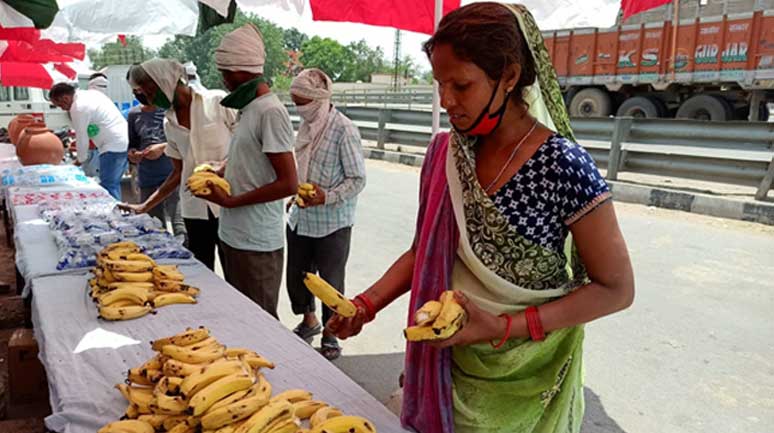
Now when we look back, we wonder what strength they (migrants) carried. What light at the end of the tunnel could they see? Was it the hope that if not their cities, then their villages will look after them? Or, what is it the pain of broken and unfulfilled promises? Or, what is it just a dire need of sustaining their hunger.
With one hand holding the sack on his head and the other holding his wife’s, Hari (changed name) reached our COVID Relief Stall on May 09, 2020. Manjari Foundation had put stalls for 15 days (from May 9 to May 23, 2020) to help hundreds of thousands of migrant workers like Hari. It seemed like those two hadn’t gotten enough food for 4 days. Yes, it had been 4 days since they started their journey from Maharashtra. Rashmi (Hari’s wife) suddenly smiled seeing the Relief Stall. Several essential items like food, water, medicines and many other things were available at those stalls. Eyes went down at her feet. Her left foot slipper had almost broken and her feet seemed swollen. She had a sigh of relief and seeing her bright smile we realised our hard work had paid off!

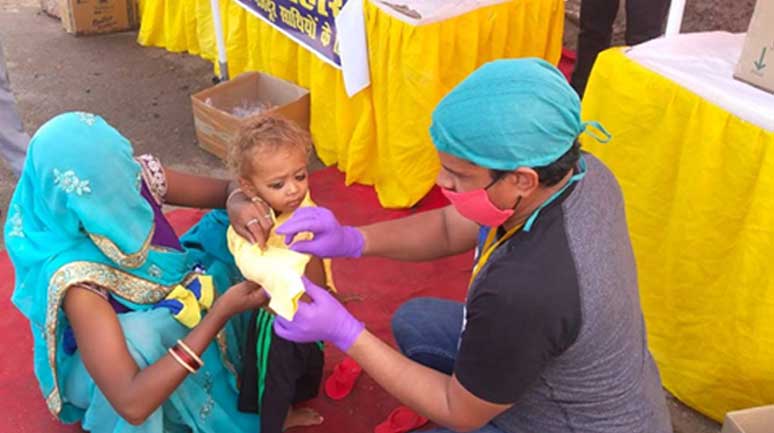
We remember her saying,“Seth ne bola ki kaam poora kar ke hi jaana. Jobhi kaam adhura chhorr kar jaayega uska vetan poora kaat liya jaayega”. Hum lockdown mein kaam kaise kar sakte the. Ab kabhi nahi aayenge city me. Do Roti Kam Kha lenge, par gaon me hi rahengee, wahi kamayenge wahi kahangee! (The owner told us that we can only leave once we have finished the work. He will not pay if we leave without completing the work. How can we work in the lockdown? We will never come to the city again. We will eat less, stay in the village and work there).”
Migration hasn’t been a new phenomenon. People migrate from rural areas to urban ones in search of better employment opportunities. But, the lockdown compelled people to move back. We call it the “Reverse Migration”. We observed thousands of migrants each day, majority being men, coming from places as far as Chennai, Lucknow, Hyderabad, Mumbai, Pune, Gorakhpur, Ahmedabad and many more.
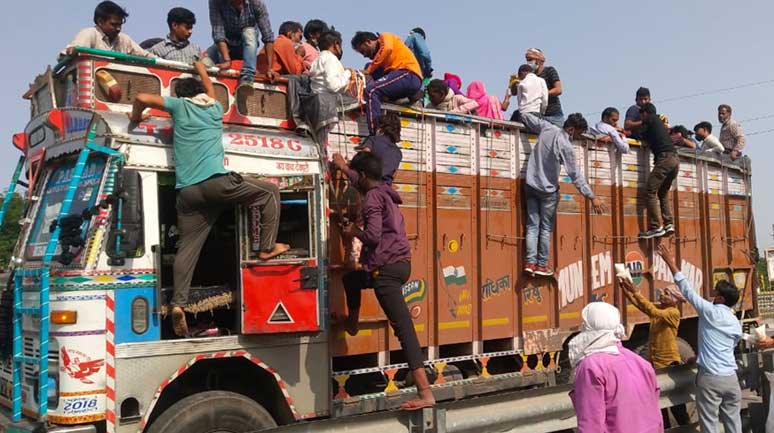
One of our camps was set up at Machkund Chaouraha, Dholpur, right at the National Highway, the place where maximum footfall was observed. We observed that approximately 65% of the migrants were males, 25% were females while 10% were children. At our stall in Morena, migrants were majorly from places like Delhi, Panipat, Gurgaon, Chandigarh and Noida while the other camp in Chittorgarh stall saw maximum migrants from Mumbai, Pune, Ahmedabad and Surat.
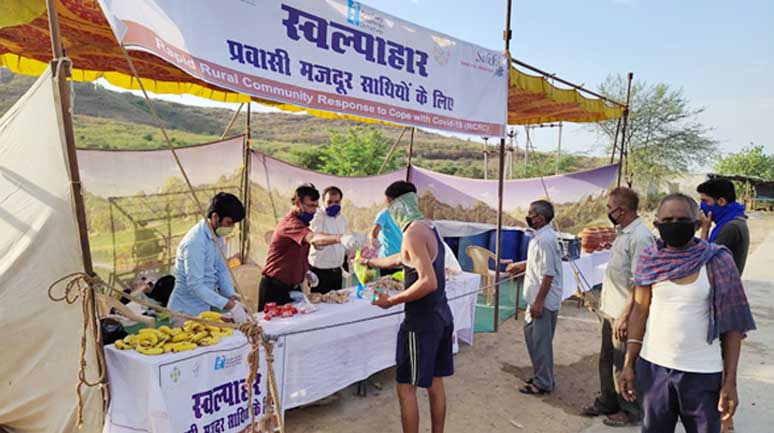
With trains, buses suspended across the country, many chose whatever was conveniently available to travel- trucks, personal bikes or loading tempos. One out of the many such trucks arrived the next day. Anita, an approximately 30-year-old woman, got out of the truck with her 2 children and her husband. Anita was expecting her third child. Her face implied her pain and we just wondered how ineptly the people have been affected. Shiv Anita’s husband) described how they started their journey on foot but was fortunate enough to find a truck halfway. He quoted, “12 Saal Bitaye Ahmedabad mein. Kabhi nahi socha tha, aise wapis aana padega (We spent 12 years in Ahmedabad. We never thought that we had to return in such conditions)”. Our hearts cry when we think about what all they faced.
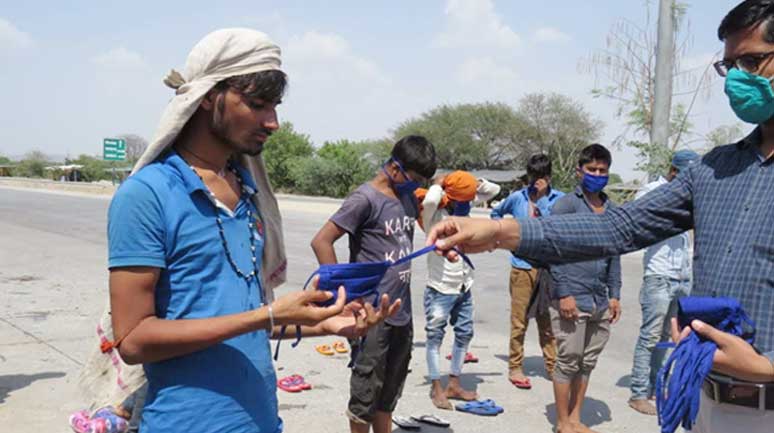
We have been grateful enough that we were in a state of helping thousands of people in need. Our stalls at Dholpur , Chittorgarh and Morena (Madhya Pradesh) provided 17 essential items and we were able to offer a helping hand to over 52000 migrants. Each member of Manjari Foundation went an extra mile to support the people.
The local administration provided a complete support towards us and helped us in achieving what we aimed at. They helped us in making migrants cross the borders smoothly from Dholpur and Chittorgarh.
Our initiative couldn’t have been a success without continuous support of Lupin Foundation, Rapid Rural Community Response to COVID 19 (RCRC), Hindustan Zinc and Azim Premji Philanthropic Initiatives (APPI). We thank each and every one who had been with us in our fight against COVID-19.
